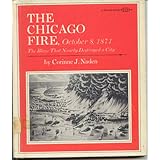
Average Reviews:

(More customer reviews)Are you looking to buy The Chicago Fire, 1871: The Blaze That Nearly Destroyed a City? Here is the right place to find the great deals. we can offer discounts of up to 90% on The Chicago Fire, 1871: The Blaze That Nearly Destroyed a City. Check out the link below:
>> Click Here to See Compare Prices and Get the Best Offers
The Chicago Fire, 1871: The Blaze That Nearly Destroyed a City ReviewOn the evening of Sunday October 8, 1871 a fire started in a barn belonging to the O'Learys. The wind and the dry weather created the Chicago fire. This book has a concise history and is lavishly illustrated. Chicago is the richest, busiest city in the heart of America. Its great railroad center was the crossroads of the nation, and Chicago was a center for commerce, industry, and culture. The fire left a third of its residents homeless, and destroyed many acres of buildings. It was one of the most terrible disasters in the history of America. Fire may be man's first tool but it is also one of the greatest hazards. Many fires resulted from a lack of fire prevention rules. The name 'Chicago' came from the Indian word for 'wild onion'. Most of the buildings were made of wood. The Chicago river divides the city into three areas. Their fire department was too small for the city, fire regulations were not enforced by the government (page 19).The summer of 1871 had been unusually warm and very dry. Newspapers warned of the danger from fire. Other fires broke out earlier that week. The colorful legend of a cow kicking over a lantern has never been proven; no one knows for sure how that fire did start (page 22). The barn burned to the ground, neighbors put out the house fire. But the wooden fence spread the fire to the adjoining house. A combination of unfortunate circumstances created a disaster. A rising wind spread sparks and debris to other homes. A fire watchman mistakenly directed firefighters to another location for an earlier fire. But the best efforts failed to stop the fire (page 27). The wind spread the fire, and the firefighters and their equipment could not stop it.
Buildings considered to be fireproof burned to the ground. Those who sought refuge in the lake found the wooden ships there were on fire. Bridges across the river burned. Explosions demolished buildings to form a firebreak. The fire spread to the mostly residential North Side. Those who fled to an open area (the Sands) found the fires had encircled them against the lake. When the waterworks burned down there was no longer any water to fight fires. Then the fire spread west. One man saved his home, but his neighbors resented this (page 45)!
This disaster had varying responses. While most were terrified, some danced and laughed. Some people were saved because they were aided, others died because of a lack of aid (page 49). Some buried valuables in the ground but later found them damaged due to the intense heat. The Monday night rain extinguished the fire by Tuesday morning. Eighteen thousand buildings were destroyed, and area 4 miles long and 1 mile wide was flattened. There was no water, no food, no transportation. Help came from nearby cities and elsewhere (page 53). The Mayor declared martial law, a few looters were shot. Governor Palmer's outraged protests ended this (page 57). Newspapers and banks soon reopened.
The Chicago fire of 1871, and the Boston fire of 1872, aroused public interest in fire-fighting. Gasoline engines for transport and pumpers, fire alarm systems, better hoses, and better prevention were learned. A National Building Code defined a "fireproof building": able to withstand fire for at least 3 hours. It is important to report any fire as quickly as possible. Every year about 11,000 Americans die from fire. Fire Prevention Week commemorates the Chicago fire of October 9 (page 65).
The Chicago Fire, 1871: The Blaze That Nearly Destroyed a City Overview
Want to learn more information about The Chicago Fire, 1871: The Blaze That Nearly Destroyed a City?
>> Click Here to See All Customer Reviews & Ratings Now
0 comments:
Post a Comment